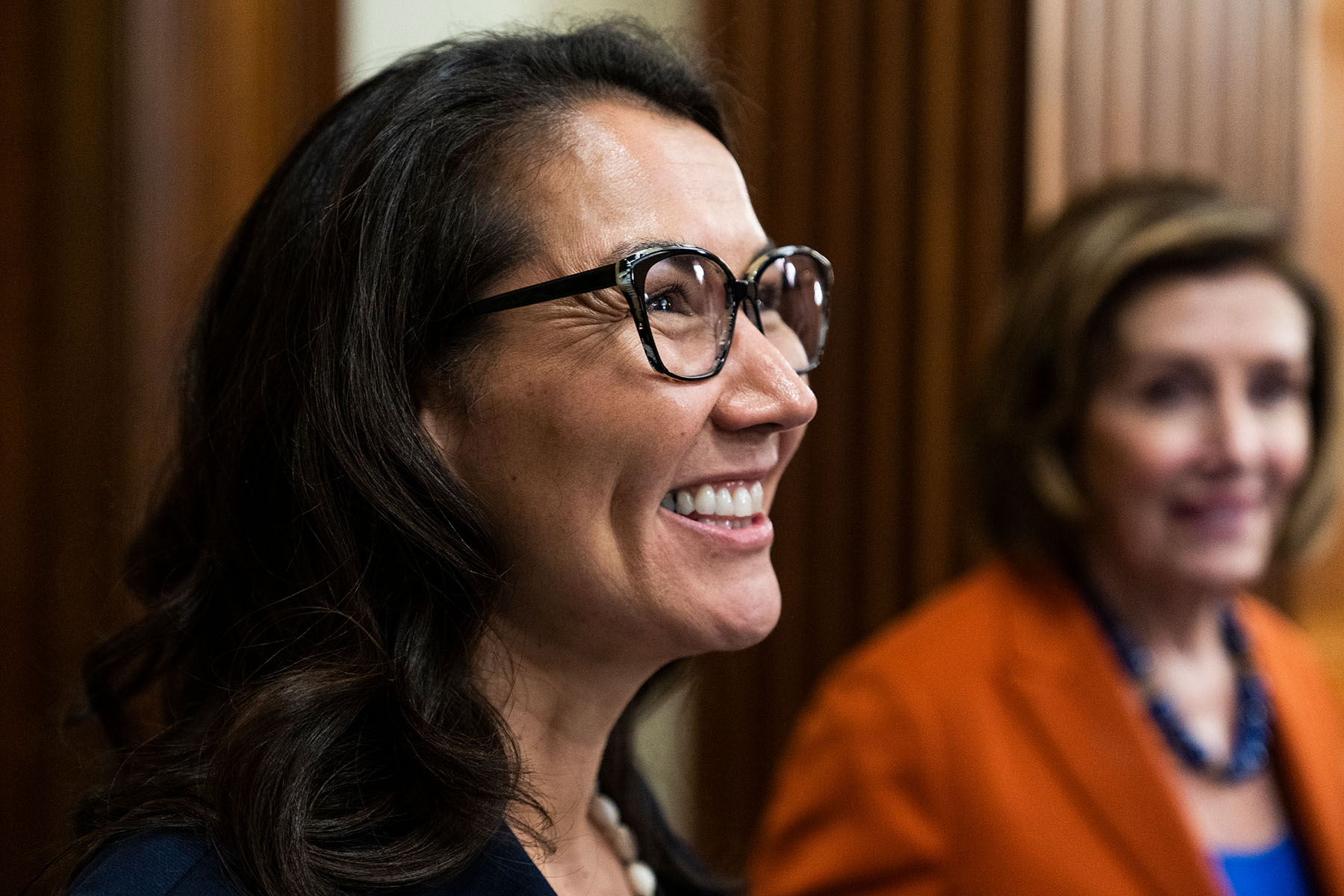We’re making sense of the midterms. Subscribe to our daily newsletter for election context and analysis.
Democratic Alaska Rep. Mary Peltola, who just two months ago became the first Alaska Native elected to Congress, won the general election and will keep her seat in the state’s only U.S. House district for a full two-year term.
Peltola’s bipartisan appeal, ability to connect with voters on local issues and the state’s new ranked-choice voting system helped propel her to victory again. She faced off against one Libertarian and two Republicans, including former Alaska Gov. Sarah Palin.
The Alaska Division of Elections announced the results of the ranked-choice process Wednesday night. Heading into Wednesday, Peltola had 48.8 percent of the vote, Palin 25.7 percent and Republican Nick Begich 23.3 percent. In the ranked-choice system, the lowest-performing candidate is eliminated and the votes for them are redistributed to others until one receives more than 50 percent of the vote.
On Wednesday, the ranked-choice process also determined that Sen. Lisa Murkowski, a Republican, will get another term.
In August, Alaska held a special election to replace late Republican Rep. Don Young, who held his position for 49 years. Heading into the August race, Peltola faced stiff competition from Palin, the state’s first woman governor, serving from 2006 to 2009, and who in 2008 became the second woman in the country to be a major party’s vice presidential nominee.
Palin had national name recognition and an endorsement from former President Donald Trump working in her favor, but many voters perceived a disconnect with the issues of her state.
“The fact that she resigned before her term as governor was over was interpreted negatively by some in Alaska as her neglecting the state in order to pursue a more national profile,” Michele Swers, a professor of American government at Georgetown University, previously told The 19th.
Though Palin lost to Peltola in the special election, the former governor had another opportunity to compete for the seat. This time around, however, Peltola had garnered more of the national spotlight as well as support from key Republicans, including Murkowski and former Young staffers.
-
More from The 19th
- In her first election as a U.S. citizen, this Michigan lawyer got to vote on a measure she co-wrote
- Using campaign funds for child care is legal — but Herschel Walker is using it as an attack
- ‘People underestimated them’: Advocates for Black women in politics want the Democratic Party to learn from the midterms
Both on the campaign trail and in her work in the nation’s capital, Peltola has demonstrated her interest in working across party lines, something her predecessor was known for. After entering the U.S. House, she hired several Republicans to her team, including Young’s former chief of staff.
“I think it represents the very unique place where Alaska Natives sit in the state, as well as Alaskans in general as far as our politics,” said Jordan James Harvill, the national program director for the advocacy group Advance Native Political Leadership. “I think for Native people in general, we don’t typically fall in the very clean lines of partisan politics. It is very normal to find a Native voter who both cares about their Second Amendment right, so that they can go hunting, at the same time that they want tribal sovereignty and clean water.”
Peltola, he said, “is beautifully weaving together what a future could look like where Native candidates run down the middle and are able to make these really substantial advancements.”
Peltola’s more visible bipartisan appeal heading into the ranked-choice general election gave her a new edge over her competitors. In a traditional voting system, voters simply pick their top candidate for each office. In Alaska’s system, voters rank all four candidates in order of preference, regardless of which party they belong to.
If one candidate gets more than 50 percent of the total vote, then they are declared the winner. If no one gets more than 50 percent, the candidate with the fewest votes is eliminated. Then in the second round, the votes for the eliminated candidate are distributed based on the voters’ second choice. Then the next candidate with the smallest share is eliminated. This is repeated until one candidate has more than 50 percent and is declared the winner.
Advocates of nonpartisan ranked-choice voting argue it gives voters more say in which candidate is elected and more viability to candidates who are women, people of color and those outside the two-party politics binary.
Republicans will have a narrow majority in the House in the next Congress while Democrats will maintain control of the Senate. Currently two other House races remain uncalled.
With Peltola’s addition to the House, for the first time Congress has full Indigenous representation with an Alaska Native member, a Native American member and a Native Hawaiian member.
The achievement, while historic, also highlights the structural barriers Native political candidates have historically faced. The 2018 election to the U.S. House of Democrats Sharice Davids and Deb Haaland, now interior secretary, was one promising sign for the future, Harvill said.
“Native women have been kind of champing at the bit to be able to step into these roles of leadership, but there have been these cultural barriers in our community for that to happen,” he said. “But we are breaking through this in our communities and this is a real moment.”






